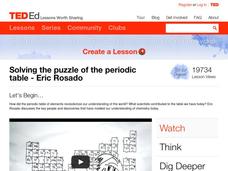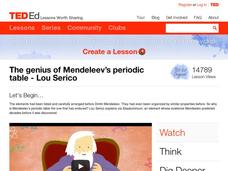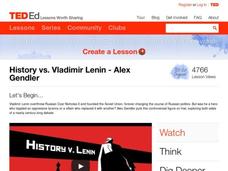TED-Ed
What Cameras See That Our Eyes Don't
Cameras are amazing tools that enhance the way we see the world. From capturing time-lapse footage of seeds sprouting or seasons changing, to high-speed photography showing a bullet crashing through its target, cameras allow us to see...
Curated OER
The Story of 'True'
The history of the English language is a long and winding road, forsooth. Here’s a short video that traces the truth about the history of the world true, from its Old English origins to modern usages. Consider generating a list of words...
TED-Ed
Overcoming Obstacles
"I focus on what I can do, and not on what I cannot." This resource is sure to touch your young learners as a truly inspiring story of a young boy who overcame a seemingly insurmountable weakness: the lack of fingers on his right hand....
TED-Ed
Situational Irony: The Opposite of What You Think
What does it meant to be ironic? Through a well-thought out series of examples and non-examples, this video seeks to put an end to misconceptions about this word's meaning. Entertaining and memorable, the video leads to a quiz. While...
TED-Ed
How to Build a Fictional World
Hear one author's take on what makes a compelling fictional world and how to build a story within it. A series of questions check if the kids were listening, and a compendium of six rich resources for expanding on this concept also...
TED-Ed
What is Deja Vu? What is Deja Vu?
Deja vu, that feeling that you've experienced something before, is a fleeting moment that many may have experienced, but for which there is no definitive explanation. While more than forty theories attempt to explain this phenomenon,...
TED-Ed
History vs. Andrew Jackson
What would happen if the values and decisions of the past were put on trial today? Watch as the answer unfolds in a clever cartoon drama centering on the presidency of Andrew Jackson. A great way of opening the door to multiple points of...
Curated OER
The ABC's of Gas: Avogadro, Boyle, Charles
Using chalkboard animation, this video thoroughly explains the three empirical gas laws: Avogadro's, Boyle's, and Charles'. Use it as an introduction when teaching young chemists about the properties and behavior of gases.
TED-Ed
The Pangaea Pop-up
The amazing animation for a video on continental drift is comprised of the pages of a sophisticated pop-up book, The Moving Earth. As the pages turn, your earth scientists discover the tectonic plates of the lithosphere and the molten...
TED-Ed
Describing the Invisible Properties of Gas
How can something we can't see be so powerful? Gas molecules make an impact! This video explains their properties: 1. Gas particles always move in a straight line. 2. They are too small to occupy any volume individually. 3. When gas...
TED-Ed
How Did Feathers Evolve?
What do dinosaurs and modern birds have in common? More than you may think. See how scientists figured out the evolutionary relationship between these seemingly disparate animals. Additionally, discover how and why the feather evolved...
TED-Ed
The Survival of the Sea Turtle
Sea turtles face a lot of adversity: storms, predators on land and in the sea, and eggs that don't hatch, but the biggest threat to these magnificent and ancient creatures is human activity. From poaching to pollution, from trash to...
TED-Ed
Is There a Difference Between Art and Craft?
How do we come to view objects and artifacts as art? What terms and ideas do we associate with craft instead? The distinction between art and craft may be subtle, but has profound roots in art history and the development of western...
TED-Ed
Solving the Puzzle of the Periodic Table
Did you know that the first time someone isolated a pure element was when Henning Brand boiled down his own urine in 1669 and unknowingly discovered phosphorus? The history of our current periodic table of elements is entertainingly...
TED-Ed
The Genius of Mendeleev's Periodic Table
The author-narrator refers to the periodic table of elements as a "massive slab of human genius," then goes on to explain Mendeleev's development of this foundational chemistry tool. Why was his version so much better than others that...
TED-Ed
From the Top of the Food Chain Down: Rewilding Our World
A eloquent narrative and unique animation expound on the megafauna and megaflora that once dominated the planet and helped keep ecosystems in balance. Is there anything that can be done to undo the damage we've done? The speaker proposes...
TED-Ed
The Twisting Tale of DNA
Introduce biology classes to the structure of DNA, the role of genes, and how mutations occur with this nifty resource. After viewing an animated video, discuss the accompanying Think questions and then explore the myriad of additional...
TED-Ed
History vs. Vladimir Lenin
Vladimir Lenin is on trial in an engaging, animated video where the merits and consequences of the formation of the Soviet Union and Lenin's actions are reviewed. This is a great way to illustrate how to establish and argue unique...
TED-Ed
Not all Scientific Studies are Created Equal
Sample size and controls are features of the scientific inquiry process that are discussed in this quick-paced quip. A comparison is made between randomized clinical trials and epidemiological studies. Terms such as placebo, cohort,...
TED-Ed
Why is Glass Transparent?
Did you ever wonder why light can pass through glass? In an animated and narrated feature, find out how when heated to a high temperature, the molecular structure of silicon dioxide results in an amorphous structure and enough space...
TED-Ed
Lessons from Auschwitz: The Power of Our Words
Some words are best left unspoken. Words matter, according to Benjamin Zander, conductor, teacher, and lecturer. To illustrate his point, Zander recounts a story told to him by a survivor of Auschwitz. As a result of her experience this...
TED-Ed
What is the World Wide Web?
Did you know that the World Wide Web and the Internet are not the same thing? Did you know that Tim Berners-Lee is considered the father of the Web? Networks, web servers, web hosts, website addresses, domain names, web languages,...
TED-Ed
How Languages Evolve
Do all languages have a common ancestor? Although no one yet knows the answer to that big question, the narrator of this short, animated video explains how linguists use migration patterns, geological features, and word clues to...
TED-Ed
What Makes Tattoos Permanent?
How can tattoos be permanent if humans shed over one million skin cells per day? Here's a short, animated video that answers this essential question and provides everything you want to know about the history of tattooing, tattoos and...
Other popular searches
- Educational Technology
- Educational Videos
- Educational Software
- Educational Career Resources
- Educational Site
- Educational Television
- Educational Toys
- Educational Statistics
- Educational Games
- +Educational +Toys
- Educational Web Directories
- Educational Goals

























